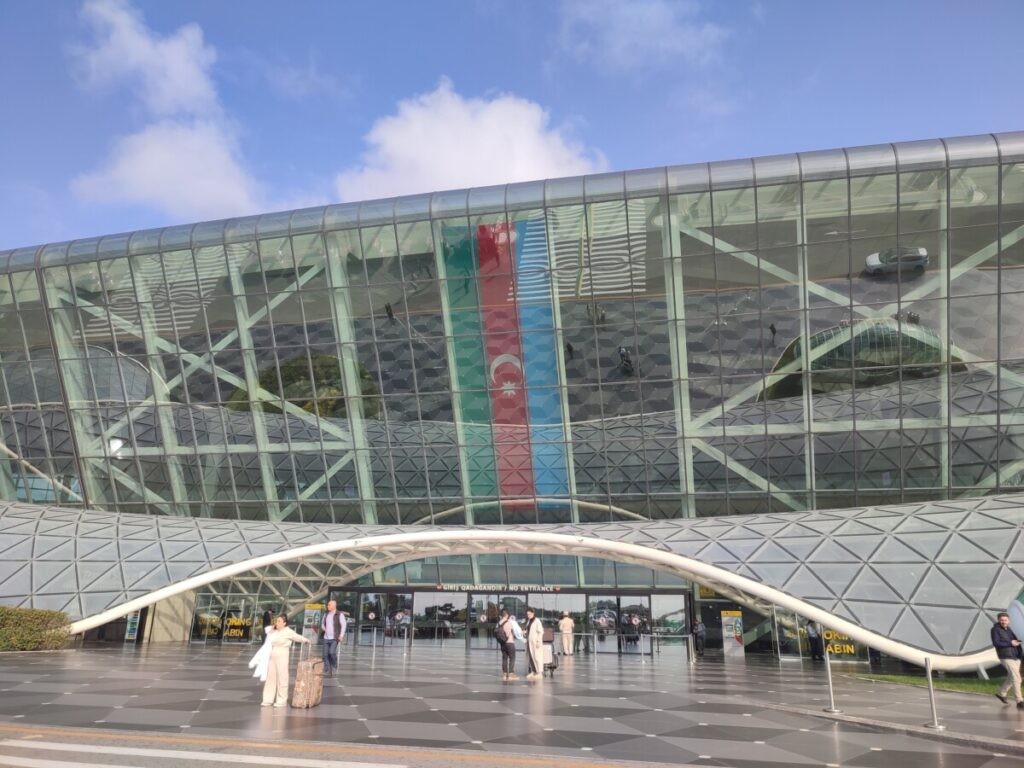Traveling from Azerbaijan to Armenia directly isn’t possible due to closed borders, but TRAVELS.EDU.VN can guide you on how to visit both countries by transiting through a third country like Georgia or Iran. This guide provides up-to-date information, ensuring a smooth and hassle-free travel experience while addressing any concerns about geopolitical issues and border crossing procedures. Discover the best routes, visa requirements, and tips for a seamless journey.
1. Understanding the Geopolitical Landscape
Armenia and Azerbaijan have a complex relationship marked by historical conflicts, making direct border crossings impossible since 1991. Despite the ongoing tensions, visiting both countries is still achievable by traveling through a third country.
1.1. The Core of the Conflict: Nagorno-Karabakh/Artsakh
The primary contention has been the Nagorno-Karabakh region (referred to as Artsakh by Armenians), which, while internationally recognized as part of Azerbaijan, was de facto controlled by the Republic of Artsakh until its formal dissolution on January 1, 2024. This region has been a significant point of conflict between the two nations.
1.2. Current Relations: Post-Conflict Scenario
Even with the resolution of the conflict in late 2023, animosity remains. The dissolution of the Republic of Artsakh led to a refugee crisis, with hundreds of thousands of ethnic Armenians fleeing the region. According to a report by the United Nations High Commissioner for Refugees (UNHCR) in November 2023, over 100,000 people were displaced following the events.
2. Visiting Azerbaijan After Armenia
Many travelers have successfully visited Azerbaijan after Armenia by transiting through Georgia. The key is to be prepared for potential questions at the border.
2.1. Personal Experience: Autumn 2022 Travel
In the fall of 2022, before the official annexation of Nagorno-Karabakh, a traveler journeyed from Armenia to Georgia and then flew to Baku. Upon arrival at Heydar Aliyev International Airport, the immigration officer noticed the Armenian stamp and inquired about the trip. The traveler truthfully answered questions about visiting Yerevan, Dilijan, Vanadzor, and Gyumri and confirmed that they had not visited Nagorno-Karabakh. The process was quick and straightforward, demonstrating that transparency is crucial.
2.2. What to Expect at Baku Airport
Baku Airport generally offers the smoothest entry experience compared to land borders. However, be ready to answer questions about your time in Armenia.
2.3. Land Border Crossings: Georgia to Azerbaijan
Some travelers crossing land borders between Georgia and Azerbaijan have reported more scrutiny. Border guards may ask detailed questions and even request hotel receipts to verify you haven’t been to Nagorno-Karabakh.
2.4. Nagorno-Karabakh/Artsakh: Important Considerations
After January 1, 2024, visiting Nagorno-Karabakh and then attempting to enter Azerbaijan became increasingly risky. With Azerbaijan now administering the region, any evidence of travel to Nagorno-Karabakh could lead to serious issues.
 Heydar Aliyev International Airport Baku
Heydar Aliyev International Airport Baku
3. Visiting Armenia After Azerbaijan
Armenia has similar protocols for visitors who have been to Azerbaijan, though historically, they were less concerned about visits to Nagorno-Karabakh.
3.1. Pre-2024 Considerations: Nagorno-Karabakh/Artsakh
Before 2024, Armenia did not typically scrutinize travelers who had visited Nagorno-Karabakh, as they considered it Armenian territory. However, policies may evolve, so it’s essential to stay updated.
3.2. Entering Armenia: What to Expect
If you arrive in Yerevan with an Azeri stamp, anticipate questions about the purpose and duration of your visit to Azerbaijan. According to the Armenian Ministry of Foreign Affairs, being honest and straightforward is the best approach.
3.3. Land Border Crossings: Georgia to Armenia
Crossing land borders from Georgia to Armenia is generally straightforward, but border officials may still ask questions about previous travels.
3.4. Personal Experience: Tbilisi to Yerevan by Train
One traveler shared an experience of a fellow backpacker who had visited Azerbaijan before entering Armenia by train from Tbilisi. The immigration officer only asked the reason for the visit to Azerbaijan and then stamped the passport without further issues.
 Train from Tbilisi to Yerevan
Train from Tbilisi to Yerevan
4. Navigating Border Crossings Between Armenia and Azerbaijan
With no open border crossings between Armenia and Azerbaijan, alternative routes are necessary.
4.1. Via Georgia: The Most Common Route
The most straightforward method is to travel back to Georgia and then enter Azerbaijan. This route is popular among tourists and offers relatively easy border crossings.
4.2. Via Iran: An Alternative Route
Another option is to transit through Iran, which may require obtaining an Iranian visa in advance. Iran offers visas on arrival for certain nationalities, but restrictions apply, particularly for citizens of the USA, UK, and Canada, who may face limitations on independent travel.
4.3. Visa Information
- Georgia: Many nationalities can enter Georgia visa-free for up to one year. Check the latest regulations on the Georgian Ministry of Foreign Affairs website.
- Iran: Visa requirements vary. Ensure you meet all prerequisites before planning your trip.
5. Final Thoughts and Recommendations for Safe Travel
Traveling in the Caucasus region can be a rewarding experience. Thousands of travelers visit Armenia, Azerbaijan, and Georgia each year without significant issues.
5.1. Key Tips for a Smooth Journey
- Be prepared to answer questions about your travels.
- Avoid any evidence of travel to Nagorno-Karabakh/Artsakh while in Armenia.
- Stay updated on the latest travel advisories and border regulations.
5.2. Resources for Travelers
- TRAVELS.EDU.VN: Provides comprehensive travel guides and updates.
- Caravanistan Forum: Offers firsthand accounts and advice from fellow travelers.
6. Detailed Travel Itinerary: Armenia and Azerbaijan via Georgia
To make your travel planning easier, here’s a detailed itinerary for visiting both Armenia and Azerbaijan via Georgia.
6.1. Day 1-3: Yerevan, Armenia
- Accommodation: Choose from a range of hotels and hostels in Yerevan. Prices range from $30 to $150 per night.
- Activities: Explore Republic Square, visit the Cascade, and tour the Matenadaran museum.
- Food: Enjoy traditional Armenian cuisine at local restaurants like Lavash or Dolmama. Expect to spend around $20-$40 per day on food.
6.2. Day 4: Travel to Tbilisi, Georgia
- Transportation: Take a marshrutka (minibus) or a private taxi from Yerevan to Tbilisi. The marshrutka costs around $10-$15, and the journey takes approximately 5-6 hours. A private taxi can cost $80-$120.
- Accommodation: Check into a hotel or guesthouse in Tbilisi. Budget options range from $25-$75 per night.
6.3. Day 5-7: Tbilisi, Georgia
- Activities: Visit Narikala Fortress, explore the Old Town, and relax in the sulfur baths.
- Food: Sample Georgian dishes like khachapuri and khinkali. Dining costs average $20-$40 per day.
6.4. Day 8: Travel to Baku, Azerbaijan
- Transportation: You can fly from Tbilisi to Baku. Flights are available daily and cost between $80-$200. The flight duration is about 1.5 hours. Alternatively, take an overnight train which costs around $30-$50.
- Accommodation: Book a hotel in Baku. Prices range from $40 to $200 per night.
6.5. Day 9-11: Baku, Azerbaijan
- Activities: Explore the Old City (Icheri Sheher), visit the Flame Towers, and stroll along the Baku Boulevard.
- Food: Try Azeri cuisine such as plov and dolma. Budget around $25-$50 per day for meals.
6.6. Day 12: Departure
- Fly from Baku to your next destination.
7. Essential Packing List for Your Caucasus Trip
Packing appropriately can make your trip more comfortable and hassle-free.
7.1. Clothing
- Lightweight and breathable clothing for warm days
- Layers for cooler evenings
- Comfortable walking shoes
- Rain jacket
- Modest clothing for visiting religious sites
7.2. Documents
- Passport and visa (if required)
- Copies of your passport and visa
- Travel insurance details
- Flight and hotel confirmations
7.3. Other Essentials
- Universal adapter
- Power bank
- First-aid kit
- Sunscreen
- Insect repellent
8. Understanding Local Customs and Etiquette
Respecting local customs can enhance your travel experience and ensure positive interactions with locals.
8.1. Armenia
- Greetings: A firm handshake is common for initial greetings.
- Hospitality: Armenians are known for their hospitality. Accepting offered food or drinks is polite.
- Religion: Dress modestly when visiting churches and monasteries.
8.2. Azerbaijan
- Greetings: Similar to Armenia, a handshake is common.
- Hospitality: Azeris are also very hospitable. Expect to be offered tea and snacks.
- Religion: Azerbaijan is a Muslim-majority country. Dress respectfully, especially in religious sites.
8.3. Georgia
- Greetings: A warm greeting and handshake are customary.
- Hospitality: Georgians are renowned for their hospitality and feasts (supra).
- Toasting: Toasts are an important part of Georgian meals.
9. Budgeting for Your Trip
Planning your budget can help you manage expenses and avoid unexpected costs.
9.1. Accommodation
- Budget: $25-$75 per night
- Mid-Range: $75-$150 per night
- Luxury: $150+ per night
9.2. Food
- Budget: $20-$40 per day
- Mid-Range: $40-$70 per day
- Luxury: $70+ per day
9.3. Transportation
- Local Transport: $5-$15 per day
- Intercity Travel: $15-$50 per trip
9.4. Activities and Entrance Fees
- $10-$30 per day
9.5. Miscellaneous
- Allow for extra expenses such as souvenirs, tips, and unexpected costs.
10. Staying Safe During Your Trip
Safety is paramount when traveling.
10.1. General Safety Tips
- Stay aware of your surroundings.
- Avoid displaying expensive jewelry or electronics.
- Keep your belongings secure.
- Use reputable transportation services.
10.2. Health Precautions
- Consult your doctor about necessary vaccinations.
- Carry a basic first-aid kit.
- Drink bottled water.
- Purchase travel insurance that covers medical emergencies.
10.3. Emergency Contacts
- Keep a list of emergency contacts, including local embassies and consulates.
- Know the local emergency numbers.
11. Exploring Cultural Differences
Understanding and respecting cultural differences is key to a fulfilling travel experience.
11.1. Language Barriers
- Learn basic phrases in Armenian, Azeri, and Georgian.
- Carry a translation app or phrasebook.
- English is spoken in tourist areas, but knowing local languages can enhance your interactions.
11.2. Social Customs
- Be aware of local customs and traditions.
- Dress modestly when visiting religious sites.
- Respect local sensitivities.
11.3. Food and Drink
- Be open to trying new foods.
- Learn about local dining etiquette.
- If offered food or drink, it’s polite to accept.
12. Top Attractions in Armenia, Azerbaijan, and Georgia
Explore the must-see sights in each country.
12.1. Armenia
- Yerevan: Republic Square, Cascade, Matenadaran, Erebuni Fortress.
- Geghard Monastery: A UNESCO World Heritage Site.
- Lake Sevan: The largest lake in Armenia.
- Tatev Monastery: Accessible by the Wings of Tatev cable car.
12.2. Azerbaijan
- Baku: Icheri Sheher (Old City), Flame Towers, Baku Boulevard, Shirvanshahs’ Palace.
- Gobustan National Park: Famous for its rock carvings.
- Sheki: Known for its historic architecture and the Palace of Sheki Khans.
12.3. Georgia
- Tbilisi: Narikala Fortress, Old Town, Sulfur Baths, Freedom Square.
- Mtskheta: An ancient capital and a UNESCO World Heritage Site.
- Kazbegi: Stunning mountain scenery and the Gergeti Trinity Church.
- Svaneti: Remote and beautiful region with unique medieval architecture.
13. How TRAVELS.EDU.VN Can Enhance Your Trip
At TRAVELS.EDU.VN, we specialize in creating personalized travel experiences that cater to your unique needs and preferences.
13.1. Customized Itineraries
We design itineraries that match your interests, whether you’re interested in history, culture, adventure, or relaxation.
13.2. Expert Guidance
Our team of travel experts provides up-to-date information and insider tips to ensure a smooth and enjoyable trip.
13.3. Hassle-Free Planning
We take care of all the details, from booking flights and accommodations to arranging tours and transportation, so you can relax and enjoy your vacation.
13.4. 24/7 Support
We offer 24/7 support to assist you with any issues or emergencies that may arise during your trip.
14. What Our Clients Say
Here are some testimonials from satisfied customers who have traveled with TRAVELS.EDU.VN:
- “TRAVELS.EDU.VN made planning our trip to the Caucasus so easy. They took care of everything, and we had an amazing time!” – John S.
- “The itinerary was perfect, and the local guides were fantastic. I highly recommend TRAVELS.EDU.VN.” – Emily R.
- “I was nervous about traveling to this region, but TRAVELS.EDU.VN provided all the information and support I needed to feel safe and confident.” – Michael L.
15. Frequently Asked Questions (FAQs)
15.1. Is it safe to travel to Armenia and Azerbaijan?
Yes, both countries are generally safe for tourists. However, it’s important to stay informed about current events and follow local advice.
15.2. What is the best time to visit Armenia and Azerbaijan?
Spring (April-May) and autumn (September-October) offer pleasant weather for exploring both countries.
15.3. Do I need a visa to visit Armenia and Azerbaijan?
Visa requirements vary depending on your nationality. Check the latest regulations on the respective embassy websites.
15.4. What currency is used in Armenia and Azerbaijan?
Armenia uses the Armenian Dram (AMD), and Azerbaijan uses the Azerbaijani Manat (AZN).
15.5. Can I use credit cards in Armenia and Azerbaijan?
Credit cards are accepted in major hotels and restaurants, but it’s a good idea to carry cash for smaller establishments and rural areas.
15.6. What languages are spoken in Armenia and Azerbaijan?
Armenian is spoken in Armenia, and Azerbaijani is spoken in Azerbaijan. Russian and English are also commonly spoken, especially in tourist areas.
15.7. Are there any cultural differences I should be aware of?
Yes, it’s important to respect local customs and traditions. Dress modestly when visiting religious sites and be mindful of local sensitivities.
15.8. How can I stay connected during my trip?
You can purchase a local SIM card or use Wi-Fi, which is available in many hotels and cafes.
15.9. What should I pack for my trip to Armenia and Azerbaijan?
Pack lightweight clothing, comfortable walking shoes, a rain jacket, and any necessary medications.
15.10. How can TRAVELS.EDU.VN help me plan my trip?
TRAVELS.EDU.VN offers customized itineraries, expert guidance, hassle-free planning, and 24/7 support to ensure a smooth and enjoyable trip.
16. Ready to Plan Your Trip? Contact Us Today
Don’t let the complexities of geopolitical issues deter you from exploring the beautiful countries of Armenia and Azerbaijan. TRAVELS.EDU.VN is here to help you navigate the process and create a memorable travel experience.
Contact TRAVELS.EDU.VN today for personalized travel planning assistance. Our experts are ready to answer your questions and tailor a travel package to suit your preferences and budget.
Address: 123 Main St, Napa, CA 94559, United States
WhatsApp: +1 (707) 257-5400
Website: TRAVELS.EDU.VN
Let travels.edu.vn take the stress out of your travel planning so you can focus on enjoying the journey. We look forward to helping you create unforgettable memories in the Caucasus!
